So, yeah... Noah.
No winning streaks last forever, not even Darren Aronofsky's. It was pretty much exactly what I feared it would be but with some angelic rock monster fantasy creatures thrown in to help the plot along.
Observations:
1. The great irony is that the rock creatures were there to make the movie's plot feasible (building the arc and defending it would have been impossible without them) but by adding them, it just made an already ridiculous piece of religious mythology even more ridiculous.
2. The most disappointing thing about this movie wasn't the story (amazingly) but that it is, by far, Aronofsky's least interesting film, visually. The only interesting visual pieces were the apocalyptic parts, so they were relying solely on sound and fury.
3. I spent the entire movie wondering where the fuck 125 million dollars went?!? (Shitty CG I guess!)
4. While juxtaposing meat eaters vs non meat eaters was a neat idea, it never quite worked out and in the end they went completely overboard making the meat eaters all seem like murderous psychopaths. Basically, it was the first big budget pro-vegan movie ever.
5. Since they insisted on using the term "the creator" for most of the film instead of "god", I thought that maybe this was going to create a cool duality where "the creator" could simply refer to the planet itself instead of a magical sky daddy... but before long they started referring to "he" and that pretty much shattered any interesting ambiguity it might have had.
6. Even after destroying the rest of the world, Gawd's "plan" still came down to two burly guys duking it out on the ark... lulz
7. As the film was wrapping up, I began to wonder if Noah himself wasn't meant to be a proxy for god, and if it wasn't him all along deciding the fate of humanity and working out all his latent sky daddy issues. Then I realized I was giving the film WAY too much credit. Yup... I really wanted this not to suck.
8. That was a crazy amount of acting talent given absolutely nothing to do.
Even Great Film Makers Stumble
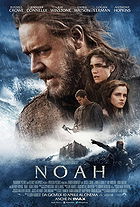 Posted : 10 years, 8 months ago on 30 October 2014 09:59
(A review of Noah)
Posted : 10 years, 8 months ago on 30 October 2014 09:59
(A review of Noah) 0 comments, Reply to this entry
0 comments, Reply to this entry
Dark, Gritty Role Playing
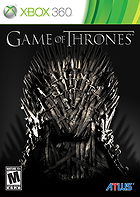 Posted : 10 years, 9 months ago on 5 October 2014 09:18
(A review of Game of Thrones)
Posted : 10 years, 9 months ago on 5 October 2014 09:18
(A review of Game of Thrones)Although it's a lower budget and less polished spiritual cousin to past Bioware RPGs, Game of Thrones is an enjoyable experience that allows you to fully immerse yourself in the lore and atmosphere of "A Song of Ice and Fire."
While having seen the show or read the books is by no means a prerequisite to enjoying the game, existing fans will almost definitely like it better and have an easier time sinking into the setting, with many of the locations and background characters already being familiar to them.
The plot of the game is just as dark and labyrinthine as the show, rarely giving you a moment of ease or a scrap of certainty before unleashing the next horrible revelation. The story does a great job of keeping you on your toes and reminding you just how frail your characters are (despite their increasing power, gameplay wise) which is something that many RPGs fail to do. If the presentation of this tale has a central flaw, it's that the tension and tragedy never let up. There's no Peter Dinklage character in the game to diffuse the situation with humor and give you a break from its dark themes.
The game takes place during season 1 of the show, starting just before the assassination of Jon Arryn and ending shortly after the death of the king. For the first half of the game, the story shifts chapter by chapter between your two main characters: (or as Martin would call them, perspective characters) Mors Westford and Alester Sarwyk.
Mors is a gruff old warrior living out what remains of his life in the Night's Watch. Alester is the son of a noble house who left the continent of Westeros in self-exile years ago and has only recently returned. Both characters served in Robert Baratheon's rebellion and have a fair amount of tragedy in their past. They also both possess special abilities that have allowed them to survive for as long as they have. Mors is a wog / "skinchanger" who can enter the mind of his attack dog (great for scouting around undetected and taking out isolated sentries) and Alester has become a red priest, infused with many of the abilities granted by the "lord of light."
I found the constant shifting between these two characters for the first half of the game a bit irritating, but at the same time it's a testament to the writing and how well the characters were designed that I never wanted to switch. If I had been playing as Mors for an hour, I wanted to keep playing as Mors, and likewise if I'd been playing as Alester. Halfway through the game their stories finally converge and the pace of the plot picks up considerably. Describing anything story related beyond this point would be too spoiler laden, but suffice it to say that the game has the kind of epic and existential conclusion that you would expect from the world of Game of Thrones.
While the game does have a strong narrative and a mostly linear path, many of the dialogue choices you make do have a legitimate affect on the outcome of your immediate quest and as a result the consequences of your actions feel quite real. For example, this isn't a game you can "white knight" your way through without paying a price. Even NPCs that have given you no reason to doubt them can let you down or outright betray you. The game's choices encourage you to consider your own needs vs simply helping out everyone else and trying to do "the most good" all the time.
Gameplay wise, the combat engine is similar to KotOR or Dragon Age. Once fighting begins, you can pull up a series of ability wheels on the fly. This doesn't pause the game, but does slow time down to a crawl as you make your selections. I thought this was well implemented since it gives you time to consider your options, but not an endless amount. Watching your opponents close in on you in slow motion or seeing one of your characters get hit while you sit there trying to choose the best response has a way of speeding up your decision making. It's also a wonderful dramatic flair to go from heated dialogue to the sudden metal rasps of weapons coming out of sheaths and then see time slowed down as you enter tactical mode.
I had a good time with Game of Thrones and I found the conclusion to be more satisfying than your average role playing game. It has some rough edges, but for a low budget RPG (with a correspondingly low price tag) I can't complain too much.
Pros
----
Excellent story
Compelling main characters
Authentic Game of Thrones soundtrack
Simple, but fun, combat engine
Choices feel consequential
Cons
----
Somewhat dated graphics
Voice acting is a mixed bag (main characters are good, most NPCs are terrible)
Limited environments that are heavily re-used
Not enough boss fights (most of your enemies are rank and file fodder)
While having seen the show or read the books is by no means a prerequisite to enjoying the game, existing fans will almost definitely like it better and have an easier time sinking into the setting, with many of the locations and background characters already being familiar to them.
The plot of the game is just as dark and labyrinthine as the show, rarely giving you a moment of ease or a scrap of certainty before unleashing the next horrible revelation. The story does a great job of keeping you on your toes and reminding you just how frail your characters are (despite their increasing power, gameplay wise) which is something that many RPGs fail to do. If the presentation of this tale has a central flaw, it's that the tension and tragedy never let up. There's no Peter Dinklage character in the game to diffuse the situation with humor and give you a break from its dark themes.
The game takes place during season 1 of the show, starting just before the assassination of Jon Arryn and ending shortly after the death of the king. For the first half of the game, the story shifts chapter by chapter between your two main characters: (or as Martin would call them, perspective characters) Mors Westford and Alester Sarwyk.
Mors is a gruff old warrior living out what remains of his life in the Night's Watch. Alester is the son of a noble house who left the continent of Westeros in self-exile years ago and has only recently returned. Both characters served in Robert Baratheon's rebellion and have a fair amount of tragedy in their past. They also both possess special abilities that have allowed them to survive for as long as they have. Mors is a wog / "skinchanger" who can enter the mind of his attack dog (great for scouting around undetected and taking out isolated sentries) and Alester has become a red priest, infused with many of the abilities granted by the "lord of light."
I found the constant shifting between these two characters for the first half of the game a bit irritating, but at the same time it's a testament to the writing and how well the characters were designed that I never wanted to switch. If I had been playing as Mors for an hour, I wanted to keep playing as Mors, and likewise if I'd been playing as Alester. Halfway through the game their stories finally converge and the pace of the plot picks up considerably. Describing anything story related beyond this point would be too spoiler laden, but suffice it to say that the game has the kind of epic and existential conclusion that you would expect from the world of Game of Thrones.
While the game does have a strong narrative and a mostly linear path, many of the dialogue choices you make do have a legitimate affect on the outcome of your immediate quest and as a result the consequences of your actions feel quite real. For example, this isn't a game you can "white knight" your way through without paying a price. Even NPCs that have given you no reason to doubt them can let you down or outright betray you. The game's choices encourage you to consider your own needs vs simply helping out everyone else and trying to do "the most good" all the time.
Gameplay wise, the combat engine is similar to KotOR or Dragon Age. Once fighting begins, you can pull up a series of ability wheels on the fly. This doesn't pause the game, but does slow time down to a crawl as you make your selections. I thought this was well implemented since it gives you time to consider your options, but not an endless amount. Watching your opponents close in on you in slow motion or seeing one of your characters get hit while you sit there trying to choose the best response has a way of speeding up your decision making. It's also a wonderful dramatic flair to go from heated dialogue to the sudden metal rasps of weapons coming out of sheaths and then see time slowed down as you enter tactical mode.
I had a good time with Game of Thrones and I found the conclusion to be more satisfying than your average role playing game. It has some rough edges, but for a low budget RPG (with a correspondingly low price tag) I can't complain too much.
Pros
----
Excellent story
Compelling main characters
Authentic Game of Thrones soundtrack
Simple, but fun, combat engine
Choices feel consequential
Cons
----
Somewhat dated graphics
Voice acting is a mixed bag (main characters are good, most NPCs are terrible)
Limited environments that are heavily re-used
Not enough boss fights (most of your enemies are rank and file fodder)
 0 comments, Reply to this entry
0 comments, Reply to this entry
The Future Is Forsaken
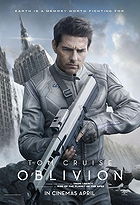 Posted : 11 years, 6 months ago on 1 January 2014 09:17
(A review of Oblivion)
Posted : 11 years, 6 months ago on 1 January 2014 09:17
(A review of Oblivion)There were three big sci-fi extravaganzas in 2013, but I didn't get to see Oblivion (the first of those three) until the end of year.
I quite enjoyed it, especially the first half of the film which had me glued to the screen. It does devolve a bit into a series of more common sci-fi tropes (and one action segment that basically looked like a videogame) but on the whole, I thought it was fun and interesting throughout. Aesthetically, it was consistently beautiful and engrossing.
I loved that there was dystopia hiding below the surface of utopia in this movie. You could tell from the beginning that things weren't what they appeared and that the shiny gloss of slick looking technology wouldn't be able to hide it forever. The film's look transitioned from clean to messy just as the characters understanding of the world evolved from stunted naivete to violent revelation.
I also really liked that drones were a central theme and as the plot unfolded they went from silent protectors to menacing enemies. In a decade where drones and drone warfare are coming to the forefront of social and political dialogue, this couldn't have been more timely.
Like Elysium, Mass Effect and many other other sci-fi projects in recent years, it would have benefited from a tighter / more fleshed out third act. I think this is a common problem for science fiction. When you're writing something that's high concept and making predictions of what the future might be, and then extrapolating into the future OF that future, satisfying endings become inherently difficult to write. Writers and producers of science fiction would do well to take their cue from 2001 - A Space Odyssey. The less said, the better. Present your ideas and let the audience draw their own conclusions.
Still, between Oblivion, Elysium and Gravity, I think it can be said with some confidence that 2013 was the first solid year for sci-fi cinema in a long time.
I quite enjoyed it, especially the first half of the film which had me glued to the screen. It does devolve a bit into a series of more common sci-fi tropes (and one action segment that basically looked like a videogame) but on the whole, I thought it was fun and interesting throughout. Aesthetically, it was consistently beautiful and engrossing.
I loved that there was dystopia hiding below the surface of utopia in this movie. You could tell from the beginning that things weren't what they appeared and that the shiny gloss of slick looking technology wouldn't be able to hide it forever. The film's look transitioned from clean to messy just as the characters understanding of the world evolved from stunted naivete to violent revelation.
I also really liked that drones were a central theme and as the plot unfolded they went from silent protectors to menacing enemies. In a decade where drones and drone warfare are coming to the forefront of social and political dialogue, this couldn't have been more timely.
Like Elysium, Mass Effect and many other other sci-fi projects in recent years, it would have benefited from a tighter / more fleshed out third act. I think this is a common problem for science fiction. When you're writing something that's high concept and making predictions of what the future might be, and then extrapolating into the future OF that future, satisfying endings become inherently difficult to write. Writers and producers of science fiction would do well to take their cue from 2001 - A Space Odyssey. The less said, the better. Present your ideas and let the audience draw their own conclusions.
Still, between Oblivion, Elysium and Gravity, I think it can be said with some confidence that 2013 was the first solid year for sci-fi cinema in a long time.
 0 comments, Reply to this entry
0 comments, Reply to this entry
An Incredible Sci-Fi Thrill Ride
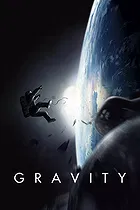 Posted : 11 years, 9 months ago on 7 October 2013 06:17
(A review of Gravity)
Posted : 11 years, 9 months ago on 7 October 2013 06:17
(A review of Gravity)I didn't have any expectations going into this film, but if I had, I'm sure they would have been met or surpassed.
Gravity is a survival horror movie without the zombies and mutants. The only enemy is space and it's more hostile and terrifying in it's total, cold indifference to life than any foe the human mind could imagine. From the start of the film, where the opening shot lasts a good 5-7 minutes without a single cut, to the adrenaline soaked ending, it's a magnificent thrill ride and a movie that absolutely must be seen in theaters.
The cinematography is amazing and although the plot is relatively simple, that in no way hampers the film. If anything, it allows the director to remain focused on what makes the film work so well: isolation. A lesser writer / director would have shown mission control. A lesser film would have insisted on more characters. A typical Hollywood film would have made cuts all over and forced dialogue in places where it wasn't needed. Gravity does none of these things. It will be a critical success (obviously) and likely a box office success in spite of shunning all the conventions that turn the vast majority of new movies into mind-numbing, artless trash.
I didn't see a single movie in theaters in 2012 because I was so sick of paying high ticket prices to be grossly disappointed. This year I've seen two films, Elysium and Gravity, and both were winners. Films like these almost give me hope for the future of cinema. Almost :Þ
Gravity is a survival horror movie without the zombies and mutants. The only enemy is space and it's more hostile and terrifying in it's total, cold indifference to life than any foe the human mind could imagine. From the start of the film, where the opening shot lasts a good 5-7 minutes without a single cut, to the adrenaline soaked ending, it's a magnificent thrill ride and a movie that absolutely must be seen in theaters.
The cinematography is amazing and although the plot is relatively simple, that in no way hampers the film. If anything, it allows the director to remain focused on what makes the film work so well: isolation. A lesser writer / director would have shown mission control. A lesser film would have insisted on more characters. A typical Hollywood film would have made cuts all over and forced dialogue in places where it wasn't needed. Gravity does none of these things. It will be a critical success (obviously) and likely a box office success in spite of shunning all the conventions that turn the vast majority of new movies into mind-numbing, artless trash.
I didn't see a single movie in theaters in 2012 because I was so sick of paying high ticket prices to be grossly disappointed. This year I've seen two films, Elysium and Gravity, and both were winners. Films like these almost give me hope for the future of cinema. Almost :Þ
 0 comments, Reply to this entry
0 comments, Reply to this entry
Bold, Engrossing Sci-Fi
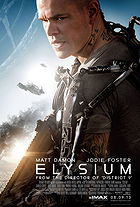 Posted : 11 years, 9 months ago on 10 September 2013 07:20
(A review of Elysium)
Posted : 11 years, 9 months ago on 10 September 2013 07:20
(A review of Elysium)Elysium is the sophomore effort of director Neill Blomkamp. Much like District 9, it has fantastic visuals, political / social commentary and it experiments with the concept of trans-humanism. It's a better film, in my opinion, and an increasingly rare example of good science fiction on the silver screen.
The movie had some nice thematic touches throughout, demonstrating that Blomkamp has grown as a director. For example, the main "Elysium" characters talk in a stilted, almost robotic manner to emphasize their fundamental disconnect with humanity. Less savvy movie goers (and critics) will chalk this up to bad acting, even though it can't be an accident that Jodie Foster and William Fichtner are doing this while the other main actors aren't.
The main villain of the film, a combination of the mad monk Rasputin and Solid Snake, is not only disconnected from humanity, but driven to insanity by a life of mercenary warfare and serving the ungrateful elites that are his masters. He is the ultimate typification of the soldier, bitterly enraged once he realizes that he is to be used and thrown away.
The ending felt a bit rushed and needed some more time to earn its emotional conclusion, but that was my only serious gripe with the film. Overall, it was a great thrill ride from start to finish and never compromised its vision.
Pros
Great pacing, action rarely lets up after the introduction
Gritty realism mixed with badass technology (The Blade Runner effect)
Strong themes (social and economic inequality, survival, trans-humanism)
High production values
Exciting fight scenes
Cons
Shaky cam
First and second act are stronger than the third
The South African actors were difficult to understand at times
The movie had some nice thematic touches throughout, demonstrating that Blomkamp has grown as a director. For example, the main "Elysium" characters talk in a stilted, almost robotic manner to emphasize their fundamental disconnect with humanity. Less savvy movie goers (and critics) will chalk this up to bad acting, even though it can't be an accident that Jodie Foster and William Fichtner are doing this while the other main actors aren't.
The main villain of the film, a combination of the mad monk Rasputin and Solid Snake, is not only disconnected from humanity, but driven to insanity by a life of mercenary warfare and serving the ungrateful elites that are his masters. He is the ultimate typification of the soldier, bitterly enraged once he realizes that he is to be used and thrown away.
The ending felt a bit rushed and needed some more time to earn its emotional conclusion, but that was my only serious gripe with the film. Overall, it was a great thrill ride from start to finish and never compromised its vision.
Pros
Great pacing, action rarely lets up after the introduction
Gritty realism mixed with badass technology (The Blade Runner effect)
Strong themes (social and economic inequality, survival, trans-humanism)
High production values
Exciting fight scenes
Cons
Shaky cam
First and second act are stronger than the third
The South African actors were difficult to understand at times
 0 comments, Reply to this entry
0 comments, Reply to this entry
Gripping. Chilling. Powerful.
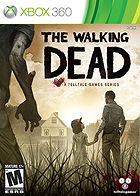 Posted : 12 years ago on 3 July 2013 09:11
(A review of The Walking Dead)
Posted : 12 years ago on 3 July 2013 09:11
(A review of The Walking Dead)The Walking Dead (Episodes 1-5) by Telltale Games is a breakthrough videogame in numerous ways. For one, it's the first DLC game to become a mega-hit and be lauded as "Game of the Year" almost universally. It far surpasses the popular television series in artistic merit, intrigue and emotional impact. And finally, it never compromises its vision or panders to its audience, creating a story that is catastrophically tragic and completely unforgettable, regardless of the choices the player makes (which are still substantial.)
I'll get the only negative out of the way and state up front that the gameplay itself is nothing special. It can even be a little frustrating until you get the mechanics down, but those mechanics are simple and it doesn't take long to adapt. The game is a combination of minor puzzle solving and "panic events" whenever zombies or other enemies attack, forcing you to react in QTE style with little or no room for error. The saving grace of this process is that if you die, the game will automatically reload very close to or right at the point where you failed.
The graphics are nothing fancy, which is probably to be expected for a DLC game, but they get the job done and the gritty, cell shaded comic-book look serves the story and atmosphere quite well. The audio is one area where the game truly shines, particularly the voice acting which is delivered by a stellar cast and feels completely authentic throughout.
The crux of the game is difficult choices, and this is what The Walking Dead does better than any other game I can think of. In most games where the player has choices he can make via dialogue trees, it's almost always obvious which choice is "good", "evil" or which is the smartest choice to give the player some kind of immediate or long term benefit. The Walking Dead takes that old hat, shits on it and sets it on fire. There are few good options in The Walking Dead and in setting that precedent, it remains faithful to the idea of a true apocalypse, a situation in which you can't just fight or talk your way out of everything because you're some amazing, all powerful individual.
Not only are the choices hard, they are TIMED. In action situations you will have to react split-second. In conversation, where the biggest decisions are made, you will usually have somewhere between 5 and 15 seconds to make up your mind and confirm your choice, depending on how urgent the situation is. The conversations often get heated and you will feel the consequences of your choices sooner rather than later.
The best compliment I can give the game is that the characters and the relationships you form with them feel more "real" than any game I can recall. You can finish all 5 episodes in 10-15 hours, but its relatively short length in no way detracts from its potency. This is a MUST PLAY game. Get the downloads or buy the whole thing on disc like I did, and get ready for one hell of a ride.
I'll get the only negative out of the way and state up front that the gameplay itself is nothing special. It can even be a little frustrating until you get the mechanics down, but those mechanics are simple and it doesn't take long to adapt. The game is a combination of minor puzzle solving and "panic events" whenever zombies or other enemies attack, forcing you to react in QTE style with little or no room for error. The saving grace of this process is that if you die, the game will automatically reload very close to or right at the point where you failed.
The graphics are nothing fancy, which is probably to be expected for a DLC game, but they get the job done and the gritty, cell shaded comic-book look serves the story and atmosphere quite well. The audio is one area where the game truly shines, particularly the voice acting which is delivered by a stellar cast and feels completely authentic throughout.
The crux of the game is difficult choices, and this is what The Walking Dead does better than any other game I can think of. In most games where the player has choices he can make via dialogue trees, it's almost always obvious which choice is "good", "evil" or which is the smartest choice to give the player some kind of immediate or long term benefit. The Walking Dead takes that old hat, shits on it and sets it on fire. There are few good options in The Walking Dead and in setting that precedent, it remains faithful to the idea of a true apocalypse, a situation in which you can't just fight or talk your way out of everything because you're some amazing, all powerful individual.
Not only are the choices hard, they are TIMED. In action situations you will have to react split-second. In conversation, where the biggest decisions are made, you will usually have somewhere between 5 and 15 seconds to make up your mind and confirm your choice, depending on how urgent the situation is. The conversations often get heated and you will feel the consequences of your choices sooner rather than later.
The best compliment I can give the game is that the characters and the relationships you form with them feel more "real" than any game I can recall. You can finish all 5 episodes in 10-15 hours, but its relatively short length in no way detracts from its potency. This is a MUST PLAY game. Get the downloads or buy the whole thing on disc like I did, and get ready for one hell of a ride.
 0 comments, Reply to this entry
0 comments, Reply to this entry
The evolution of a franchise continues
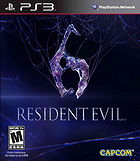 Posted : 12 years ago on 17 June 2013 03:47
(A review of Resident Evil 6)
Posted : 12 years ago on 17 June 2013 03:47
(A review of Resident Evil 6)The Resident Evil series has traditionally been characterized by four main attributes.
1) Over the top, campy storyline
2) Creepy horror atmosphere
3) Resource conservation
4) Annoying puzzles
The game has slowly changed since RE4, moving toward a more action oriented, roller coaster experience rather than haunting isolation and cautious exploring. Many fans have criticized this move, but after playing the last three installments I believe this is definitely the proper direction for the franchise to have moved in.
For one thing, Resident Evil was never going to be a better horror game than its main competitor, Silent Hill. They both have atmospheric tension, but the "jump scares" of Resident Evil were never going to rival the slow building psychological horror of its smarter cousin. In that vein, Resident Evil needed to evolve or die. There's only so many times you can be satisfied with a game that makes you spend half its length backtracking through the same rooms finding keys, cards, cranks and emblems to help you move past the next absurd puzzle left for you by insane, millionaire bio-terrorists.
The more recent Resident Evils have tapered off on the puzzles and key fetching, leaving only a trickle of that tradition behind in Resident Evil 6. Resource conservation was still a factor in both RE4 and RE5, but RE6 leaves it in the dust by making hand-to-hand combat more effective and giving all defeated enemies the chance to drop items. I welcomed this change because it made the game more fun and versatile and because the idea of "conservation" was always an artificial construct to begin with. No matter what part of a RE game you're in, the game designers had to leave you the bare minimum of health and ammo to get through the next segment or risk making your save file worthless, possibly necessitating a restart. But the only reason that would ever happen would be willful stupidity on the player's part (using up your items, saving and only using one save slot.) Therefore, the conservation aspect of Survival Horror games has always been overblown.
The horror atmosphere of Resident Evil is very much still present. There aren't as many jump scares as there used to be, but that's probably because our heroes are more powerful and experienced. It makes sense that they're no longer surprised by old fashion shuffling zombies when they have to fight armed J'avo and giant mutant creatures on a regular basis. Our characters have become a more hardened breed (and so have the gamers controlling them.)
The Resident Evil storyline is more fun than ever. RE6 gives us a multi-layered plot unveiled in four separate but occasionally interwoven campaigns. There are seven playable characters, all with unique motivations for stopping Umbrella's latest schemes. The drama gets hammy at times, but that's to be expected (and it's part of the fun, really.)
To the extent that I had gripes with the game, they could have been addressed with a little more thought and tweaking. The game no longer allows you to scan through your equipment or select items while paused. This doesn't make the game any more "realistic" in a meaningful way, and it certainly isn't helpful. I lost count of the times that I was just trying to take stock of my inventory and I either got ambushed from behind, or an enemy ran up to attack me before I could close the item menu and react. Resident Evil needs to adopt a "wheel" system that temp-pauses. This has been done in countless other games and would have been easy to implement. The "cover" system in RE6 is trash to the point of being almost unusable, but that's ok because you don't actually need it. I don't know why they bothered with such a shoddy and unnecessary feature.
The other major source of frustration in RE6 was the lack of instruction while fighting the final bosses of each campaign. Each powerful boss is (in between shooting and dodging) a series of quick time events and mini-puzzle elements which must be solved before you can truly hurt the boss and move onto the next stage of the battle. The problem is, you're usually too busy trying to stay alive to figure out what you're supposed to do. The game gives you only vague clues, and no clear communication on what to do or how to do it. This was the most unfortunate aspect of RE6, as the boss fights look and feel epic, but the stunted gameplay subtracts from their enjoyment.
On the plus side, we can now, finally, move and shoot at the same time (long time RE fans rejoice!) In addition to more effective unarmed combat, there are new evasive tactics like side rolling, the run / slide, and jumping backwards and shooting from the ground. The skill system also allows you to customize your character to the play style you enjoy, a flexibility that no past Resident Evil has offered.
Although it's been bumpy at times, the evolution of Resident Evil has definitely been a good thing. Nostalgia for the old games creeps back occasionally, but I've definitely enjoyed the newer titles. Resident Evil 6 can frustrate at times, but at its best, it's a captivating thriller and an action extravaganza that no summer blockbuster can compete with. Games like RE6 have made big budget action movies largely irrelevant, because now you can immerse yourself in these exciting feats instead of just watching them.
1) Over the top, campy storyline
2) Creepy horror atmosphere
3) Resource conservation
4) Annoying puzzles
The game has slowly changed since RE4, moving toward a more action oriented, roller coaster experience rather than haunting isolation and cautious exploring. Many fans have criticized this move, but after playing the last three installments I believe this is definitely the proper direction for the franchise to have moved in.
For one thing, Resident Evil was never going to be a better horror game than its main competitor, Silent Hill. They both have atmospheric tension, but the "jump scares" of Resident Evil were never going to rival the slow building psychological horror of its smarter cousin. In that vein, Resident Evil needed to evolve or die. There's only so many times you can be satisfied with a game that makes you spend half its length backtracking through the same rooms finding keys, cards, cranks and emblems to help you move past the next absurd puzzle left for you by insane, millionaire bio-terrorists.
The more recent Resident Evils have tapered off on the puzzles and key fetching, leaving only a trickle of that tradition behind in Resident Evil 6. Resource conservation was still a factor in both RE4 and RE5, but RE6 leaves it in the dust by making hand-to-hand combat more effective and giving all defeated enemies the chance to drop items. I welcomed this change because it made the game more fun and versatile and because the idea of "conservation" was always an artificial construct to begin with. No matter what part of a RE game you're in, the game designers had to leave you the bare minimum of health and ammo to get through the next segment or risk making your save file worthless, possibly necessitating a restart. But the only reason that would ever happen would be willful stupidity on the player's part (using up your items, saving and only using one save slot.) Therefore, the conservation aspect of Survival Horror games has always been overblown.
The horror atmosphere of Resident Evil is very much still present. There aren't as many jump scares as there used to be, but that's probably because our heroes are more powerful and experienced. It makes sense that they're no longer surprised by old fashion shuffling zombies when they have to fight armed J'avo and giant mutant creatures on a regular basis. Our characters have become a more hardened breed (and so have the gamers controlling them.)
The Resident Evil storyline is more fun than ever. RE6 gives us a multi-layered plot unveiled in four separate but occasionally interwoven campaigns. There are seven playable characters, all with unique motivations for stopping Umbrella's latest schemes. The drama gets hammy at times, but that's to be expected (and it's part of the fun, really.)
To the extent that I had gripes with the game, they could have been addressed with a little more thought and tweaking. The game no longer allows you to scan through your equipment or select items while paused. This doesn't make the game any more "realistic" in a meaningful way, and it certainly isn't helpful. I lost count of the times that I was just trying to take stock of my inventory and I either got ambushed from behind, or an enemy ran up to attack me before I could close the item menu and react. Resident Evil needs to adopt a "wheel" system that temp-pauses. This has been done in countless other games and would have been easy to implement. The "cover" system in RE6 is trash to the point of being almost unusable, but that's ok because you don't actually need it. I don't know why they bothered with such a shoddy and unnecessary feature.
The other major source of frustration in RE6 was the lack of instruction while fighting the final bosses of each campaign. Each powerful boss is (in between shooting and dodging) a series of quick time events and mini-puzzle elements which must be solved before you can truly hurt the boss and move onto the next stage of the battle. The problem is, you're usually too busy trying to stay alive to figure out what you're supposed to do. The game gives you only vague clues, and no clear communication on what to do or how to do it. This was the most unfortunate aspect of RE6, as the boss fights look and feel epic, but the stunted gameplay subtracts from their enjoyment.
On the plus side, we can now, finally, move and shoot at the same time (long time RE fans rejoice!) In addition to more effective unarmed combat, there are new evasive tactics like side rolling, the run / slide, and jumping backwards and shooting from the ground. The skill system also allows you to customize your character to the play style you enjoy, a flexibility that no past Resident Evil has offered.
Although it's been bumpy at times, the evolution of Resident Evil has definitely been a good thing. Nostalgia for the old games creeps back occasionally, but I've definitely enjoyed the newer titles. Resident Evil 6 can frustrate at times, but at its best, it's a captivating thriller and an action extravaganza that no summer blockbuster can compete with. Games like RE6 have made big budget action movies largely irrelevant, because now you can immerse yourself in these exciting feats instead of just watching them.
 0 comments, Reply to this entry
0 comments, Reply to this entry
Things that go "bump" in the night still work
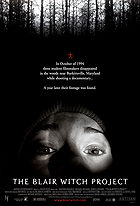 Posted : 12 years, 1 month ago on 10 May 2013 03:52
(A review of The Blair Witch Project)
Posted : 12 years, 1 month ago on 10 May 2013 03:52
(A review of The Blair Witch Project)Despite the huge hoopla that surrounded it thirteen years ago, I had never seen The Blair Witch Project until last night. My observations :
Pros
1. Effective
2. Good performances
3. Proof that less is more
Cons
1. One trick pony
2. Very short at 80 minutes
3. The plot device that caused them to "lose" the map was ridiculous
4. Spawned an entire genre of "found footage" films, none of which were nearly as good.
I would have given it a 6/10 if it were not for the aforementioned plot device which was straight up laughable. Even leaving the map out in the open and having the "Blair Witch" take it would have been more believable.
Pros
1. Effective
2. Good performances
3. Proof that less is more
Cons
1. One trick pony
2. Very short at 80 minutes
3. The plot device that caused them to "lose" the map was ridiculous
4. Spawned an entire genre of "found footage" films, none of which were nearly as good.
I would have given it a 6/10 if it were not for the aforementioned plot device which was straight up laughable. Even leaving the map out in the open and having the "Blair Witch" take it would have been more believable.
 0 comments, Reply to this entry
0 comments, Reply to this entry
Tarentino is back!
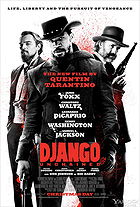 Posted : 12 years, 1 month ago on 7 May 2013 06:05
(A review of Django Unchained)
Posted : 12 years, 1 month ago on 7 May 2013 06:05
(A review of Django Unchained)Django Unchained was an entertaining breath of fresh air and a return to form for Quentin Tarentino. I was bored for all but 5 minutes of "Death Proof" and either bored or asleep for the excruciating 2 and a half hours of "Inglourious Basterds", so I was a little worried when i saw that Django was almost 3 hours long. Thankfully, that long run time passed in what felt like minutes.
Django takes everything about the traditional western and turns it on its head. Instead of a white hero on a white horse and a bunch of comically stereotyped minorities we get a black hero on a dark horse poking fun at the violent, racist period that's been glorified over and over throughout film history. The best example of this is the scene which shows the first ride of (what will become) the KKK, a bunch of clueless idiots complaining that they can't see out of their poorly made hoods; only to be scattered by a simple distraction.
There are wonderful performances from the heroes and villains alike, but I thought the most enjoyable aspect of the movie was probably the soundtrack. It draws on music from just about every era and hearing a modern rap song while our main characters mosey-ed along on their horses made me laugh and applaud.
The ultra-violence of the gun fights is well filmed and comically absurd (giant ribbons of shooting blood), an effective combination of action and comedy. This is contrasted with the other violent parts of the movie, demonstrating just how brutal American slavery of blacks was for a long period of our short history. Some might call these scenes over the top or unnecessary, but they miss the point. They are exactly what is needed before Django can justly carry out his revenge on the slavers and ride into the sunset.
Django takes everything about the traditional western and turns it on its head. Instead of a white hero on a white horse and a bunch of comically stereotyped minorities we get a black hero on a dark horse poking fun at the violent, racist period that's been glorified over and over throughout film history. The best example of this is the scene which shows the first ride of (what will become) the KKK, a bunch of clueless idiots complaining that they can't see out of their poorly made hoods; only to be scattered by a simple distraction.
There are wonderful performances from the heroes and villains alike, but I thought the most enjoyable aspect of the movie was probably the soundtrack. It draws on music from just about every era and hearing a modern rap song while our main characters mosey-ed along on their horses made me laugh and applaud.
The ultra-violence of the gun fights is well filmed and comically absurd (giant ribbons of shooting blood), an effective combination of action and comedy. This is contrasted with the other violent parts of the movie, demonstrating just how brutal American slavery of blacks was for a long period of our short history. Some might call these scenes over the top or unnecessary, but they miss the point. They are exactly what is needed before Django can justly carry out his revenge on the slavers and ride into the sunset.
 0 comments, Reply to this entry
0 comments, Reply to this entry
Potent, but far from perfect
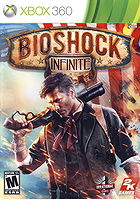 Posted : 12 years, 2 months ago on 4 May 2013 06:15
(A review of BioShock Infinite)
Posted : 12 years, 2 months ago on 4 May 2013 06:15
(A review of BioShock Infinite)Bioshock Infinite is a fine game, but perhaps not as fine as the reviews would lead you to believe. It crafts an engaging tale and the shoot-em-up gameplay with bio powers is what we've come to expect from the series, but it has its fair share of flaws.
For me, the gameplay felt like a step back from the first two games in many ways. The limitation on two equipped weapons seemed needless and was frustrating at times. The Sky-lines, while visually incredible and providing some of the more exciting moments of the game, were not well integrated with the combat engine. Attempting skyline strikes was more trouble than it was worth and shooting while zipping around the skylines was often a waste of ammo.
As a game world, Columbia is undeniably creative and unique, but not nearly as engrossing as the twisted halls of Rapture. With its dark atmosphere and frightening half-human, half-monster enemies, the first Bioshock was a shooter/horror hybrid that could keep me on pins and needles. Infinite rarely came close to that feeling, and most of its enemies were cartoonish in nature (the one exception being the frightening "Siren" that could resurrect seemingly endless dead foes.)
The plot is the strongest aspect of Infinite, but it has problems as well. (Minor spoilers in the next two paragraphs.) Like all plots that involve time travel and alternate dimensions, Bioshock Infinite creates its own logic to operate on. This, however, leads to many "why?" and "why not?" questions that can only be answered with "plot convenience." The twist in the original Bioshock was a more simple, elegant device and as a result it felt a lot more authentic than the one in Bioshock Infinite that relies on a tangled web of pretend physics. This, however, I was happy to overlook in exchange for the emotionally powerful ending that the game offers; an ending which is undoubtedly one of the best of this generation and maybe one of the best ever in videogames.
What I was not willing to overlook is the giant false equivalency that the game creates halfway through its storyline. The game goes to great lengths to show how the powerful figures of Comstock and Fink have created a brutally oppressive, dystopian world of racism and worker abuse with a slowly building resistance movement in the background. Then, suddenly, when the resistance springs into action, they're immediately painted as blood thirsty terrorists who are somehow as bad as the oppressors they're revolting against. This is done for no good reason but to give your main character more targets to shoot at. That was a major disappointment and sacrificed a good deal of integrity that the story might have had. While the major theme of Bioshock has always been extremist ideologies, the writers incorrectly defined resistance to oppression as an ideology. It is not.
While I'm offering a fair amount of criticism for this game, I still greatly enjoyed Bioshock Infinite. This is yet another game where the story was likely stronger than the gameplay that brought it to life. Critics of narrative games love to endlessly point that out and say "YOU'RE DOING IT WRONG!" What those "gameplay is all that matters" fanatics fail to realize is that while the medium of videogames will always have greater artistic potential to create interesting new methods of gameplay, videogames will ALSO still have the potential to tell stories more immersive than film and literature can hope to, because they make you an active participant in the story rather than just an observer. Even if the way you can interact is limited, or the "choices" aren't really choices, there is still great value in the ability to shift someones perspective from passive to active, and Bioshock Infinite takes great advantage of that.
For me, the gameplay felt like a step back from the first two games in many ways. The limitation on two equipped weapons seemed needless and was frustrating at times. The Sky-lines, while visually incredible and providing some of the more exciting moments of the game, were not well integrated with the combat engine. Attempting skyline strikes was more trouble than it was worth and shooting while zipping around the skylines was often a waste of ammo.
As a game world, Columbia is undeniably creative and unique, but not nearly as engrossing as the twisted halls of Rapture. With its dark atmosphere and frightening half-human, half-monster enemies, the first Bioshock was a shooter/horror hybrid that could keep me on pins and needles. Infinite rarely came close to that feeling, and most of its enemies were cartoonish in nature (the one exception being the frightening "Siren" that could resurrect seemingly endless dead foes.)
The plot is the strongest aspect of Infinite, but it has problems as well. (Minor spoilers in the next two paragraphs.) Like all plots that involve time travel and alternate dimensions, Bioshock Infinite creates its own logic to operate on. This, however, leads to many "why?" and "why not?" questions that can only be answered with "plot convenience." The twist in the original Bioshock was a more simple, elegant device and as a result it felt a lot more authentic than the one in Bioshock Infinite that relies on a tangled web of pretend physics. This, however, I was happy to overlook in exchange for the emotionally powerful ending that the game offers; an ending which is undoubtedly one of the best of this generation and maybe one of the best ever in videogames.
What I was not willing to overlook is the giant false equivalency that the game creates halfway through its storyline. The game goes to great lengths to show how the powerful figures of Comstock and Fink have created a brutally oppressive, dystopian world of racism and worker abuse with a slowly building resistance movement in the background. Then, suddenly, when the resistance springs into action, they're immediately painted as blood thirsty terrorists who are somehow as bad as the oppressors they're revolting against. This is done for no good reason but to give your main character more targets to shoot at. That was a major disappointment and sacrificed a good deal of integrity that the story might have had. While the major theme of Bioshock has always been extremist ideologies, the writers incorrectly defined resistance to oppression as an ideology. It is not.
While I'm offering a fair amount of criticism for this game, I still greatly enjoyed Bioshock Infinite. This is yet another game where the story was likely stronger than the gameplay that brought it to life. Critics of narrative games love to endlessly point that out and say "YOU'RE DOING IT WRONG!" What those "gameplay is all that matters" fanatics fail to realize is that while the medium of videogames will always have greater artistic potential to create interesting new methods of gameplay, videogames will ALSO still have the potential to tell stories more immersive than film and literature can hope to, because they make you an active participant in the story rather than just an observer. Even if the way you can interact is limited, or the "choices" aren't really choices, there is still great value in the ability to shift someones perspective from passive to active, and Bioshock Infinite takes great advantage of that.
 0 comments, Reply to this entry
0 comments, Reply to this entry
 Login
Login
 Home
Home 17 Lists
17 Lists 36 Reviews
36 Reviews Collections
Collections